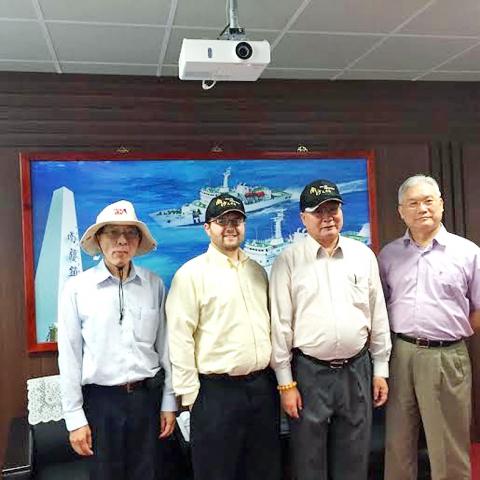The US hopes Taiwan’s new government can make available relevant historical data on the South China Sea and shed light on the status of the Republic of China’s (ROC) “U-shaped line” in the region in the face of international law, National Taiwan Ocean University’s Institute of the Law of the Sea director Robert Chen (陳荔彤) said on Thursday.
The “U-shaped line” refers to the ROC’s formal claim of sovereign territory in the South China Sea post-World War II, in accordance with agreements made in the Cairo Declaration of Nov. 27, 1943, and the Potsdam Declaration of July 26, 1945.
Chen was in Washington last week for an annual meeting of the American Society of International Law.

Photo: Tsao Yu-fen, Taipei Times
According to Chen, US officials said Washington felt President Ma Ying-jeou’s (馬英九) administration did not react strongly enough to China’s large-scale land reclamation projects in the South China Sea, adding that the US felt the Ma administration had not showed great support toward the US sending ships and planes into the region to bolster freedom of navigation and flight.
While the Ma administration’s explanation of the “U-shaped line” is correct, the most important part is the claims based on “historic rights,” Chen said.
Under the UN Convention on the Law of the Sea (UNCLOS), territorial water can only be claimed if it is connected to a nation’s sovereign territory, Chen said, adding that the “U-shaped line” contravened this.
However, Chen also said that the UNCLOS came into effect in 1980, while the ROC had already claimed islands — most notably Itu Aba Island (Taiping Island, 太平島) — in the South China Sea in 1947, adding that despite the ROC government retreating to Taiwan in 1949, the nation’s claim was staked in 1947 and should not be given up lightly.
The incoming government should continue to adhere to such ambiguous claims, Chen said, adding that an “actual takeover” of the islands in the South China Sea had been researched, announced and implemented without dispute at the time.
Chen said he told US officials that Taiwan’s claims had strategic ambiguity and he hoped the US would support such a move, adding that Taiwan would not seek to cooperate with China in the South China Sea, nor would it enter into conflict against China over the issue.

INVESTIGATION: The case is the latest instance of a DPP figure being implicated in an espionage network accused of allegedly leaking information to Chinese intelligence Democratic Progressive Party (DPP) member Ho Jen-chieh (何仁傑) was detained and held incommunicado yesterday on suspicion of spying for China during his tenure as assistant to then-minister of foreign affairs Joseph Wu (吳釗燮). The Taipei District Prosecutors’ Office said Ho was implicated during its investigation into alleged spying activities by former Presidential Office consultant Wu Shang-yu (吳尚雨). Prosecutors said there is reason to believe Ho breached the National Security Act (國家安全法) by leaking classified Ministry of Foreign Affairs information to Chinese intelligence. Following interrogation, prosecutors petitioned the Taipei District Court to detain Ho, citing concerns over potential collusion or tampering of evidence. The

Seventy percent of middle and elementary schools now conduct English classes entirely in English, the Ministry of Education said, as it encourages schools nationwide to adopt this practice Minister of Education (MOE) Cheng Ying-yao (鄭英耀) is scheduled to present a report on the government’s bilingual education policy to the Legislative Yuan’s Education and Culture Committee today. The report would outline strategies aimed at expanding access to education, reducing regional disparities and improving talent cultivation. Implementation of bilingual education policies has varied across local governments, occasionally drawing public criticism. For example, some schools have required teachers of non-English subjects to pass English proficiency

‘FORM OF PROTEST’: The German Institute Taipei said it was ‘shocked’ to see Nazi symbolism used in connection with political aims as it condemned the incident Sung Chien-liang (宋建樑), who led efforts to recall Democratic Progressive Party (DPP) Legislator Lee Kun-cheng (李坤城), was released on bail of NT$80,000 yesterday amid an outcry over a Nazi armband he wore to questioning the night before. Sung arrived at the New Taipei City District Prosecutors’ Office for questioning in a recall petition forgery case on Tuesday night wearing a red armband bearing a swastika, carrying a copy of Adolf Hitler’s Mein Kampf and giving a Nazi salute. Sung left the building at 1:15am without the armband and apparently covering the book with a coat. This is a serious international scandal and Chinese

TRADE: The premier pledged safeguards on ‘Made in Taiwan’ labeling, anti-dumping measures and stricter export controls to strengthen its position in trade talks Products labeled “made in Taiwan” must be genuinely made in Taiwan, Premier Cho Jung-tai (卓榮泰) said yesterday, vowing to enforce strict safeguards against “origin laundering” and initiate anti-dumping investigations to prevent China dumping its products in Taiwan. Cho made the remarks in a discussion session with representatives from industries in Kaohsiung. In response to the US government’s recent announcement of “reciprocal” tariffs on its trading partners, President William Lai (賴清德) and Cho last week began a series of consultations with industry leaders nationwide to gather feedback and address concerns. Taiwanese and US officials held a videoconference on Friday evening to discuss the